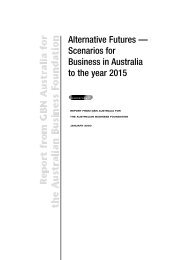Teaching for uncertain futures - Neville Freeman Agency
Teaching for uncertain futures - Neville Freeman Agency
Teaching for uncertain futures - Neville Freeman Agency
Create successful ePaper yourself
Turn your PDF publications into a flip-book with our unique Google optimized e-Paper software.
35implications of the scenarios <strong>for</strong> the teaching professionUnder the VolcanoIn this divided society, schooling ispolarised. The ‘haves’ have high levels of access tobusiness affluence and influence while the ‘have nots’are marginalised. There is a wide variance in teachersalaries, reflecting competition among schools <strong>for</strong>good teachers or teachers with particular skills.In many schools, teachers find their pastoral careresponsibilities take away from their ability to teacheffectively.In this world the teaching profession is highlyadaptable and resilient, and well steeped intechnological know-how. The impact of a generalsocial mood of pessimism and revolution is counteredby the quest <strong>for</strong> self-fulfilment and personal growth,while the cult of youth and rejection of tradition infavour of innovation make it mandatory <strong>for</strong> teachersto make use of technologies in extending learningopportunities.These changes in the nature of teaching have animpact on how teachers are selected and trained.Selection into teacher education courses needs totake account of the schooling divide, with programsneeding to recruit students to teach in either thetechnologically well-endowed elite schools or thepoorer schools in socially disaffected areas. A highlevel of technological literacy is a requirement <strong>for</strong> allnew teacher education entrants, and e-learning is wellharnessed in the pedagogical repertoire of universityprograms. Teacher education programs are dynamicand innovative, preparing teachers to be flexibleand innovative.Once in schools, these highly technologicallyproficient teachers are faced with varying levels oftechnological infrastructure and support. Even inpoorer schools, they are able to engage students inlearning through technology. Their training standsthem in good stead <strong>for</strong> adapting their practice tomeet the different needs of students. The diverseneeds of business and the economy generally <strong>for</strong> skillsand technological know-how means the curriculumis broad and dynamic, and there are many pathwaysto success <strong>for</strong> students. The measure of schooling isindividual success rather than the public good.Engaging with the local community is less importantin the more technologically advanced elitist schools,but is critical in poorer areas where teachers play astrong nurturing role <strong>for</strong> both students and thecommunity generally. They act as agents ofintegration, assimilating students from differentcultures and backgrounds. The school is an importantcommunity centre.Continuing professional learning <strong>for</strong> teachers inthis world is focused on upgrading technologicalknowledge on the one hand, and on dealing with socialissues and teaching basic skills on the other.In this world, leadership is a balancing act betweenresponsiveness to the demands of corporate or othersponsors and professional responsibilities. It calls <strong>for</strong> boththe capacity to cater <strong>for</strong> disaffected local communities andthe ability to engage with the pedagogical possibilities oftechnology to achieve education outcomes appropriate <strong>for</strong>an innovative society.Teachers in this world do not enjoy great recognition<strong>for</strong> their work. Their skills in using technologies <strong>for</strong>learning are well matched, and generally betterrewarded, in other professions, although those whoare successful in the competitive market <strong>for</strong> teachers areheld in high esteem. The quid pro quo <strong>for</strong> this successis the high degree of scrutiny of their per<strong>for</strong>mance,as in the corporate world.The blurring of lines between pastoral care andprofessional practice tends to diminish the statusof teaching.



